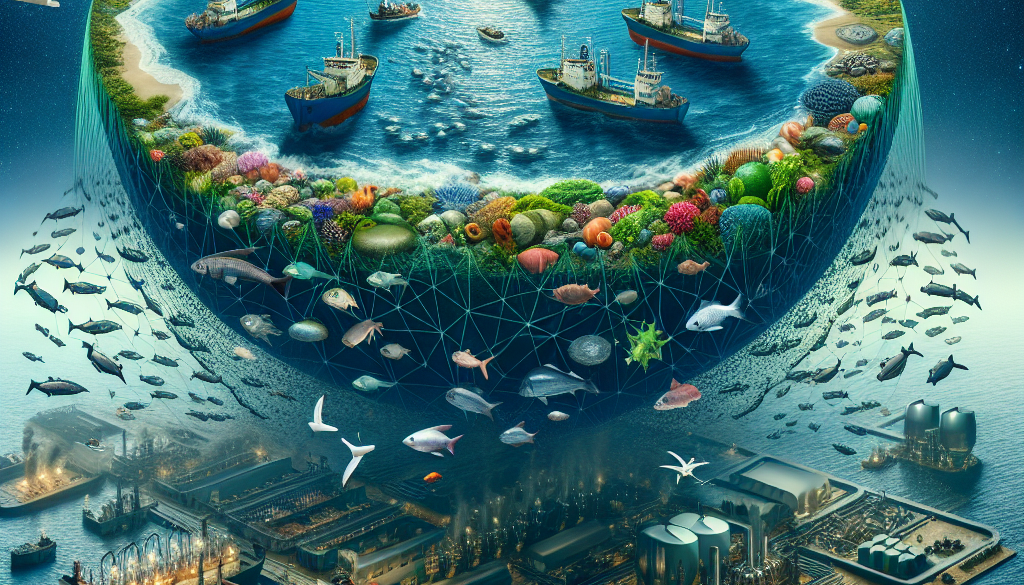Navigating Toward Sustainability: The Crucial Journey of Seafood Supply
-
Table of Contents
- Seafood Sustainability: Steering the Supply Chain Towards a Greener Future
- The State of Our Oceans
- Challenges in Achieving Seafood Sustainability
- Strategies for Sustainable Seafood Supply
- Case Studies of Success
- Statistics to Consider
- Conclusion: The Path Forward
- ETprotein: A Sustainable Protein Alternative
Seafood Sustainability: Steering the Supply Chain Towards a Greener Future

The journey towards sustainability in the seafood industry is a complex and critical one. With the world’s oceans under increasing pressure from overfishing, habitat destruction, and climate change, the need for a sustainable seafood supply has never been more urgent. This article delves into the challenges and solutions within the seafood supply chain, exploring how we can navigate towards a more sustainable future.
The State of Our Oceans
Our oceans are the lifeblood of the planet, providing food, regulating climate, and supporting biodiversity. However, they are facing unprecedented threats. According to the Food and Agriculture Organization (FAO), about 34.2% of global fish stocks are overfished, meaning they are harvested at a faster rate than they can reproduce. This not only endangers the species themselves but also the millions of people who rely on seafood as a primary source of protein.
Challenges in Achieving Seafood Sustainability
The path to sustainable seafood is fraught with challenges that span environmental, economic, and social dimensions. Here are some of the key obstacles:
- Overfishing: The demand for seafood has led to fishing practices that harvest more fish than ecosystems can sustain.
- Illegal, Unreported, and Unregulated (IUU) Fishing: IUU fishing contributes to overfishing, undermines marine conservation efforts, and distorts competition.
- Bycatch: Unintentional capture of non-target species can lead to declines in those populations and disrupt ecosystems.
- Habitat Destruction: Certain fishing methods, such as bottom trawling, can damage the seafloor and vital habitats like coral reefs and mangroves.
- Climate Change: Rising ocean temperatures and acidification affect fish populations and their habitats.
- Lack of Traceability: Without proper tracking systems, it’s difficult to ensure that seafood is legally and sustainably sourced.
Strategies for Sustainable Seafood Supply
To address these challenges, a multifaceted approach is necessary. Here are some strategies that stakeholders across the supply chain can implement:
- Adopting Sustainable Fishing Practices: Methods like pole-and-line fishing or selective gear can reduce bycatch and habitat damage.
- Enforcing Regulations: Stronger enforcement of existing laws and international agreements can combat IUU fishing.
- Establishing Marine Protected Areas (MPAs): MPAs can help replenish fish stocks and protect ecosystems.
- Improving Traceability: Technologies like blockchain can enhance the transparency of the seafood supply chain.
- Consumer Awareness: Educating consumers about sustainable seafood choices can drive market demand in the right direction.
- Collaboration: Partnerships between governments, NGOs, and the private sector are crucial for sharing knowledge and resources.
Case Studies of Success
There are several examples of successful sustainability initiatives within the seafood industry:
- The Marine Stewardship Council (MSC) certification has led to the recovery of several fish stocks, such as the Patagonian toothfish.
- Community-based management in places like the Philippines has empowered local fishers to sustainably manage their resources.
- Advancements in aquaculture, such as recirculating systems and polyculture, have reduced environmental impacts.
Statistics to Consider
Statistics highlight the importance and impact of sustainable practices:
- MSC-certified fisheries saw a 46% increase in biomass on average, according to a 2018 report.
- A study by the University of British Columbia found that if managed sustainably, global fish catches could increase by 16 million metric tons.
- The FAO reports that aquaculture now provides 52% of all fish consumed by humans, underscoring the need for sustainable practices in this sector.
Conclusion: The Path Forward
The journey towards a sustainable seafood supply is not only crucial for the health of our oceans but also for the livelihoods and food security of billions of people worldwide. By implementing sustainable fishing practices, enforcing regulations, improving traceability, and fostering collaboration, we can ensure that our oceans continue to thrive for generations to come. The success stories and statistics provide hope and a blueprint for how we can turn the tide towards sustainability.
ETprotein: A Sustainable Protein Alternative
In the quest for sustainable food sources, ETprotein offers a range of plant-based protein products that serve as alternatives to seafood. Their organic vegan proteins, including rice, pea, and various seed proteins, are produced with sustainability in mind. These products provide a nutritious option for those looking to reduce their environmental footprint without compromising on quality or taste.
About ETprotein:
ETprotein, a reputable protein and L-(+)-Ergothioneine (EGT) Chinese factory manufacturer and supplier, is renowned for producing, stocking, exporting, and delivering the highest quality organic bulk vegan proteins and L-(+)-Ergothioneine. They include Organic rice protein, clear rice protein, pea protein, clear pea protein, watermelon seed protein, pumpkin seed protein, sunflower seed protein, mung bean protein, peanut protein, and L-(+)-Ergothioneine EGT Pharmaceutical grade, L-(+)-Ergothioneine EGT food grade, L-(+)-Ergothioneine EGT cosmetic grade, L-(+)-Ergothioneine EGT reference grade and L-(+)-Ergothioneine EGT standard. Their offerings, characterized by a neutral taste, non-GMO, allergen-free attributes, with L-(+)-Ergothioneine purity over 98%, 99%, cater to a diverse range of industries. They serve nutraceutical, pharmaceutical, cosmeceutical, veterinary, as well as food and beverage finished product distributors, traders, and manufacturers across Europe, USA, Canada, Australia, Thailand, Japan, Korea, Brazil, and Chile, among others.
ETprotein specialization includes exporting and delivering tailor-made protein powder and finished nutritional supplements. Their extensive product range covers sectors like Food and Beverage, Sports Nutrition, Weight Management, Dietary Supplements, Health and Wellness Products, and Infant Formula, ensuring comprehensive solutions to meet all your protein needs.
As a trusted company by leading global food and beverage brands and Fortune 500 companies, ETprotein reinforces China’s reputation in the global arena. For more information or to sample their products, please contact them and email sales(at)ETprotein.com today.












